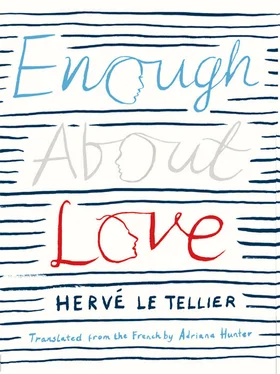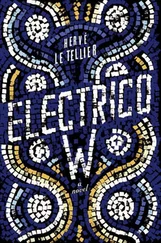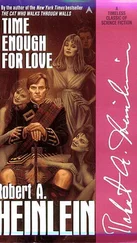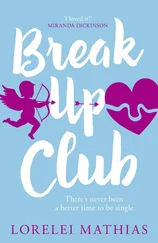Anna cannot make up her mind between two dresses, one in pink and green, short, very 1960s Courrèges, and a longer, more sensible one in gray and red. The pretty blond woman beside her is facing the same dilemma.
“It really is very pretty,” says Anna, who has tried on the shorter one, “but I can’t wear it for work, and I’d never dare go out in it.”
“Well, I’ll buy it then,” says Louise, laughing, “I’ll wear it at the law courts under my long black robes.”
• •
S OME NIGHTS when Stan is on duty at the Quinze-Vingts, Yves drops in to see Anna on the rue Érasme, after she has put the children to bed. She cooks dinner for two and spends the evening in his arms, always worried Karl might wake and catch them together.
One evening, Anna takes Yves to her bedroom. She opens a closet, eases out three dusty shoe boxes, and carries them to the kitchen. In them are hundreds of photographs. She lays out her life before Yves, perhaps for him. It is a long time since she has looked inside these boxes.
He recognizes her in the dark-haired little girl in overalls using every inch of her body to thrust a swing into the blue of the sky; in the girl on the brink of adolescence dancing with her father, almost like a woman in love. In another she is wearing a white dress, sitting in a boat on a pond in a landscaped garden. The picture could have been taken in the 1920s. Yves recognizes the man holding the oars. He is a writer. “Isn’t that Hugues Léger with you, in that boat?”
“It is. Do you know him?”
“Not very well. I really like his books, we used to have the same publisher.”
“He and I were together, for a year. We’re still friends. I could get you together for dinner if you like.”
She continues rummaging through the boxes, takes out photographs of her wedding, pointing things out, making comments. Yves thinks that, in front of him, with him, Anna is drawing up the inventory of everything she is preparing to lose. Right now, she is asking him to find the words that will help her draw on her own strength to give up what each photo says. Look at this happiness, my happiness, my husband, my house, my children, my parents, look. It’s all there, spread out on this kitchen table, years of life in fading colors, I give them to you, I’ll abandon them for you, my love. But what about you, what are you offering? Tell me that.
Anna is afraid she will never “be able to do it.” Sometimes, in order to convince herself, she cites Jane Birkin, Romy Schneider, other women — often actresses — who had several significant men in their lives; what Anna actually says is “several lives,” as if each man counted as a life. She looks for role models, examples, who say, Yes, she has a right to this too. Because it is something she is owed.
But she has her doubts.
“You know,” she says one evening when they are in the car, “I worry so much about not being able to do it. I often just tell myself: Anna, don’t. Do it.”
Yves bursts out laughing. “Did you hear what you just said? You said, ‘Don’t do it.’ ”
Anna did hear herself. All her ambivalence is in those words. “Don’t. Do it” or “Don’t do it.” All down to a period and the subconscious.
• •
I DON’T KNOW if I have a best friend. Sometimes I can wake up and not know how old I am. I’ve set my clock ten minutes fast to make sure I leave on time, but I now take the extra ten minutes into account, which cancels them out. I’d like to write a book with the title A Book Not Worth Reading and have it published by a company called Minor Press in a collection known as Complete Obscurity, so that I can say: “I had a book not worth reading published in complete obscurity by a minor press.” I was once left by a woman, and I cut my mattress in two, so that I didn’t have to sleep on her side. I can never find my keys when I have to go out in a hurry. I like the pillow to be cool when I go to bed. I once knew a man called Deadman who introduced himself like this: “Deadman, like dead man without the gap.” I will go to hell. I’ve watched the image of the tsunami unleashing itself onto the Indonesian coast at least ten times on television. I own sneakers, tennis shoes, climbing boots (worn only twice), lace-up walking boots, black moccasins, elegant black shoes, slippers, rubber-soled sandals, and yellow flippers. I know that my favorite film isn’t a very good film. I often wonder what would be different about the world if I didn’t exist.
Yves puts down Hugues Léger’s first book, Definition . A litany of sentences, almost a thousand of them, in which the writer sketches a self-portrait in disjointed fragments. The previous evening, Hugues killed himself, at home, with a bullet through the mouth. Anna is in Berlin for a few days, she probably does not yet know. Yves immediately wrote an obituary for Libération , and managed to arrange through a journalist friend for it to be published, even though a different article had already been approved for the page layout. In it he said this did not mean that Hugues’s last book, Autolyze , which deals with suicide, should be seen as “a will waiting to be unsealed”; it was not “the cathartic book his friends would have liked to see him write, the book that would open up the creative field he still needed to open. But Autolyze , his most accomplished book, could exist in its own right without the dim reflected light of his death, which he need not have foretold.”
The dinner Anna wanted would never happen, today’s lover would never meet yesterday’s. But Yves feels a blossoming friendliness toward Hugues, whose resolute death tries in vain to forbid friendship. He has reread his books, hoping to find in them the man Anna must have loved, and has identified a dark intelligence of life in his sentences. One he found particularly touching, violently so, was the closing sentence of Definition: “The best day of my life may already be behind me.” Before meeting Anna, Yves also thought the best day of his life was already behind him. He also knows that the woman who caused Hugues to cut his mattress in two is Anna. She is the sort of woman you might want to sacrifice a bed for.
Anna harbored more than affection for Hugues.
“You know, Hugues,” she once reassured him, “if you’re ever having difficulties, you can always come and stay with us for a few days. It wouldn’t be a problem, we have a guest room.”
One evening — two years later — he rang their doorbell, suitcase in hand. He had had a row with his partner, he was out on the street. Anna was in Normandy and Stan opened the door. He did not know what to say to the man in the hallway: he did not know him, Anna had never mentioned any invitation and, since then, Karl had been born and the guest room was now his. Stan asked Hugues in before calling Anna. She explained the new situation to her old boyfriend. Hugues did not take offense but went and slept in a hotel, in spite of Stan’s offer to put a cot in his office.
When she told Yves this anecdote, there was nostalgia in her voice. She had grown apart from Hugues, she said with regret, it would have been an opportunity to know each other in a different way, to become proper friends. But she actually said this: “It’s a shame. If Hugues had stayed with us, we could have had a different relationship.”
Yves laughed at the ambiguity. He knows that when Anna talks about “having a relationship,” it almost always means a sexual one.
• •
A NNA HAS NEVER KEPT COUNT of her sessions with Le Gall, but Le Gall writes the number 1,000 at the top of the page. That’s a lot. You could have bought yourself a nice Porsche with some optional extras, Yves calculated. He is wrong: Thomas has paid off a small house in an Italian village near La Spezia.
Читать дальше












